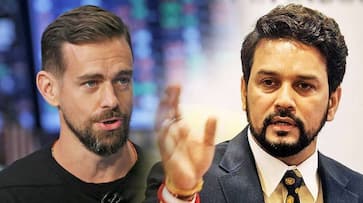Twitter CEO Jack Dorsey and its senior officials refused to appear before the parliamentary body on February 11, citing that the notice period given to them for the hearing was “short”. This despite the fact that the hearing, which was initially scheduled for February 7, was postponed to February 11 to allow Dorsey and others from Twitter adequate time to make themselves available
Accused of ideological bias against right-wing users, Twitter is now evading appearing before the Parliamentary Committee on Information Technology headed by Anurag Thakur.
Twitter CEO Jack Dorsey and its senior officials refused to appear before the parliamentary body on February 11, citing that the notice period given to them for the hearing was “short”. This despite the fact that the hearing, which was initially scheduled for February 7, was postponed to February 11 to allow Dorsey and others from Twitter adequate time to make themselves available.
Arrogant @twitterIndia declined to appear before India's Parliamentary Committee. its not only showing the arrogance of twitter but also showing Daal me kuch kaala nhi Balki poori Daaal hi Kaali hai #CheaterTwitter
— Tajinder Pal Singh Bagga (@TajinderBagga) February 9, 2019
India is one of Twitter’s biggest markets and one which it is still growing.
Dorsey had earlier been grilled by the US Congress in September 2018. Twitter’s CEO testified before the House Energy and Commerce Committee to defend the social network from allegations of bias and explain what the company is doing to protect its users and crack down on misinformation.
Dorsey had also testified before the American Senate intelligence committee with Facebook COO Sheryl Sandberg about what the companies are doing to protect the integrity of the 2018 US midterm elections.
In India, Youth for Social Media Democracy (YSMD) had launched a massive anti-Twitter protest on February 3 outside the Lado Sarai office of Twitter India, alleging that the social media platform was biased against Right-wing accounts. The protestors alleged that the social networking service behaves in a politically biased way towards the left and centre ideology.
Twitter CEO declined to appear before Indian parliamentary committee on IT over their outright biasness however jack is very quick to apologize to American RWs over silly remarks.
— Comrade Squinty (@squintneon) February 9, 2019
Difference is Trump takes these things very seriously, not same with top officials in India. pic.twitter.com/QeOTFv5Tcu
Earlier, Thakur asked common people for opinions on citizens’ data security. Anyone could send suggestions or concerns to comit@sansad.nic.in.
On Friday, Twitter India had issued a statement regarding the allegations of bias. "Earlier today, there was a peaceful protest outside our Delhi office. We welcome feedback of our service and respect people using their voices to be heard. We have one set of rules which outline the behaviors we allow on Twitter. We have a global team responsible for enforcing these rules, and this team does not make decisions on the basis of ideological or political viewpoints — it is fundamentally against our values as a company. We enforce our policies equally and without bias.”
Fact is @Twitter would NOT have the GUTS to do this to a US committee . Tomorrow if I , for eg am on a Parliamentary committee , I would think it is not desirable , someone ignores the summons . Go there @TwitterIndia , we are with u..Stand your ground ! But GO don't disrespect
— Tehseen Poonawalla (@tehseenp) February 9, 2019
YSMD had said: “The instance of such strong political biases during an election year is an attempt to influence India’s elections, which violates the right to free and fair elections, which is a fundamental ethos of Indian Democracy. Rules must be consistently applied without any such biases, however, there are repeated instances of such biases when it comes to reporting accounts or verification of them [sic].”
Last Updated Feb 9, 2019, 4:51 PM IST









![Salman Khan sets stage on fire for Anant Ambani, Radhika Merchant pre-wedding festivities [WATCH] ATG](https://static-gi.asianetnews.com/images/01hr1hh8y86gvb4kbqgnyhc0w0/whatsapp-image-2024-03-03-at-12-24-37-pm_100x60xt.jpg)
![Pregnant Deepika Padukone dances with Ranveer Singh at Anant Ambani, Radhika Merchant pre-wedding bash [WATCH] ATG](https://static-gi.asianetnews.com/images/01hr1ffyd3nzqzgm6ba0k87vr8/whatsapp-image-2024-03-03-at-11-45-35-am_100x60xt.jpg)


